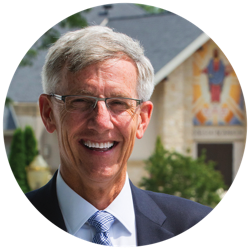Not long ago, most American Catholic colleges and universities (CCUs) were easily identifiable by their adherence to a few first principles. They offered a liberal arts education to ensure the “cultivation of the mind” for students in their final years of formation. Academic freedom meant pursuing truth by considering alternative views. And thirdly, institutional conscience was sensitive and responsive to the teachings of the Roman Catholic Church.
Today, not so much.
In many cases, it is imprudent to assume institutional adherence to these first principles simply because “Catholic” is present in either the school’s name or heritage.
We’ve seen the Granddaddy of CCUs in America served with a canon law petition documenting 23 years of institutional behavior that is seemly inconsistent with the teachings of the faith. Some CCUs honor individuals or allow for the presence of organizations that support the genocide of our times—abortion. Recently, we learn of an 80-year old Roman Catholic Priest renouncing his Holy Orders as a result of what he learned from his CCU community. Thus, there can be a discontinuity between an institution’s public image purporting to be a CCU and its private actions making it difficult to discern its actual Catholic identity to the casual observer.
It seems on a Catholic campus being a guest might be a different experience than being a resident.
All is not lost. There are many CCUs that publicly assert and faithfully practice their Catholic identity. They foster an academic climate that cherishes those first principles. They file lawsuits for government infringement upon their right to freely exercise their Catholic faith…and, as we all know, there is no Constitutional authority for our government in higher education. We have schools that honor those that defend life and human dignity and stand up for the common good. Many promote the mandatum credential held by their theologians…especially the young theologians. They are proud of this credential. The challenge, today, is finding these schools from amongst the 230+ CCUs in America. A strong Catholic identity ought not to be assumed.
For those seeking a Catholic higher education at a Catholic institution, the question has become, how can one ascertain the strength of institutional Catholicity? The search is made easier by considering 15 signal features centered on alignment, culture, and engagement (ACE)…a framework useful for understanding how these signal features work in unison to help measure a reflection of the Catholic faith within daily institutional life.
Alignment
The first five signal features are oriented on the institutional purpose and leadership (administrative, faculty, and student) objectives with the Catholic Church. The translation of Church teachings within the context of the CCU is best illuminated in the mission statement. This serves as a guide for vertical institutional alignment—what the faculty and staff seek to accomplish as well as how the student body will respond—while simultaneously connecting the local effort with the global Church. Its importance can be found in the artifacts and activities of normal campus life.
Culture
The Catholic culture is exhibited in the actions and judgments within a community seeking to be in union with the teachings of the Catholic Church. Catholicism is a term of art often applied to a community that “denotes the system of teachings, doctrine, and practices of the Roman Catholic Church.” You can think of this as a particular worldview. An undergraduate Catholic college campus has historically been a community of faculty, staff, and students oriented on witnessing to their faith as they are simultaneously engaged in the development—physical, spiritual, and intellectual—of young men and women. However, the manner with which this is accomplished does vary. There is not a “right” way to foster and exercise a Catholic culture.
Since its inception, Catholicism has reflected both global and local traditions. The documents of Second Vatican Council remind us that it is Catholic awareness—not universal mandates—that mark a culture attuned to the tenants of the faith while engaging with the world. If a CCU campus takes seriously the teachings of the Church, then the Catholic culture will guide all aspects of campus life, from administrative decision-making to curricular/co-curricular activities and the formation of students. An active Catholic culture that permeates the institutional life of the school can contribute to the successful achievement of the educational mission.
Engagement with the Christian Tradition
For centuries, the Catholic Church has served as a steward for knowledge: preserving, transmitting, and generating new understandings as intellectual inquiry and faith mutually challenge mankind’s advancement. The Catholic intellectual tradition (CIT) is the distinctive approach to sharing an educational inheritance that is 2,000 years old. It is an approach to gaining knowledge that blends content with conduct, allowing students to develop habits that will lead to one’s fulfillment and happiness. For the Christian, the path to discovering truth—and the unity of truth—leads to the awareness and awesomeness of God.
The Catholic Church’s understanding is that teaching and learning emanate from both the natural order of the world and the divine revelations of God. The teachings of Vatican Council II through the documents promulgated by Pope John Paul II sustain the centuries-old and unbroken conviction expressed by St. Augustine of Hippo, “Intellege ut credas; crede ut intellegas” (“understand in order to believe, believe in order to understand”). The conviction that faith and reason are both present and necessary in order for individuals to gain the knowledge and wisdom needed to move closer to the truth is foundational to Catholic education. Thus, there remains an expectation that higher education at a CCU will move beyond the intellectual and include development of the soul.
Last thought
The first university, established at Bologna, Italy, in A.D. 1088, was Catholic, as were the subsequent universities in Paris, France (A.D. 1150), and Oxford, England (A.D. 1160). In fact, the Latin Church had supported the monastic schools for centuries, from which emerged all of the earliest universities. The Catholic Church continues her involvement in higher education, recognizing that “the direction of today’s society principally is placed in the mentality and hearts of universities today.” Thus, the distinctiveness of the Catholic approach is the preparation of students–of all faiths–with a higher-level education leading to an understanding of both the natural world and their individual purpose. This has been the Catholic manner of education for over 900 years and it is built upon that 2,000 year-old “conversation with the world.”
Through the use of the 15 signal features situated in the ACE framework, a prospective student (or employee) can begin to measure higher education institutions that truly seek to remain aligned with the Church founded by Jesus Christ. In shining a light on these features, you can begin to see those few “First Principles” and the Catholic traditions at work (or not) even as a guest in the neighborhood.
_____________________________________________________
1. For a deeper understanding of the framework (alignment, culture, and engagement) as well as the 15 signal features, see Collins, T. J. (2013). An external perspective on institutional catholicity in higher education: A case study (Doctoral dissertation). Available from ProQuest Dissertations and Theses database. (UMI No. 3575556)
2. Bunson, M. (Ed.). (2004). OSVs encyclopedia of Catholic history. Huntington, IN: Our Sunday Visitor Publishing Division.
3. Pius XII, 1952, as cited in United States Conference of Catholic Bishops, Committee on Education. (2006). Catholic identity in our colleges and universities: A collection of defining documents. Washington, DC: United States Conference on Catholic Bishops.

